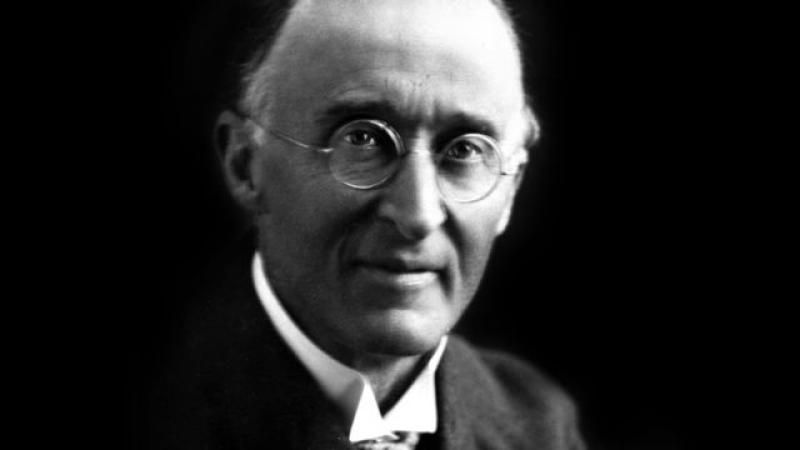Delius: Composer, Lover, Enigma, BBC Four | reviews, news & interviews
Delius: Composer, Lover, Enigma, BBC Four
Delius: Composer, Lover, Enigma, BBC Four
Was the mysterious composer really English? (And was he any good?)

Serious programmes about classical music are now virtually invisible on the major channels. There’s always BBC Two’s Maestro at the Opera, I hear you shout. Or something with that nice Gareth Malone. A good selection of Proms will be shown live on BBC Four, but with luck will scrupulously avoid the witless interviews with celebs in lieu of proper interval talks.
He was born Fritz Delius in Bradford in 1862 of German stock. His tyrannical father Julius had good reason to be disappointed in his rebellious son. Fritz grew to distrust organised religion at an early age, bunking off church visits and relying on an older sister to fill him in with details of the sermons he’d missed so as to convince his devout, fingernail-inspecting father that he’d absorbed every word. Understandably apprehensive about a future marooned in the Yorkshire wool industry, Delius managed to persuade his father to send him to Florida to run an orange plantation. Success in the world of citrus fruit proved elusive, but the exoticism of the surroundings and the music he heard the plantation workers singing transformed Delius’s life. He went to Leipzig to study music, subsequently moving to Paris, where his circle included Ravel and Gauguin.
Enigma Variations completely overshadowed Delius’s success
In Paris, he composed operas, symphonic poems, songs – significantly avoiding conventional, more formal structures. There are no Delius symphonies. It was suggested that this came from the composer’s desire to live for the moment, on enjoying every pleasure as it comes, never worrying about the future. And Delius was the most unlikely of hedonists – prim and tight-lipped. There was a lovely contribution from his friend Percy Grainger, explaining that Delius “was a sex-worshipper, who practiced immorality with puritanical stubbornness”. It was in Paris that Delius contracted the syphilis which ultimately killed him. Footage of semi-naked Moulin Rouge dancers rammed home the point. Never having heard a note of his large-scale work, Delius arranged a concert of his music in London in 1899. Back in Bradford, Julius read a review in The Times (“I see that Fritz has had a concert”). Unfortunately, Elgar’s Enigma Variations were premiered in London shortly afterwards, completely overshadowing Delius’s success.
 Talking heads debated whether Delius was an English composer at all, most agreeing that his music is a polyglot mixture of French, German and Norwegian influences. His musical style is hard to pin down. Flashy orchestral textures rarely seem to combine with memorable tunes. Fireworks erupt and disappear without trace. The musical extracts in the film threw up surprises such as the banjos in the opera Koanga which predate Porgy and Bess by 30 years. There was a staggering extract from Songs of Sunset, in which soprano and baritone swooned while delivering Ernest Dowson’s near-pornographic text: “O red pomegranate of thy perfect mouth/My lips' life fruitage might I taste and die.”
Talking heads debated whether Delius was an English composer at all, most agreeing that his music is a polyglot mixture of French, German and Norwegian influences. His musical style is hard to pin down. Flashy orchestral textures rarely seem to combine with memorable tunes. Fireworks erupt and disappear without trace. The musical extracts in the film threw up surprises such as the banjos in the opera Koanga which predate Porgy and Bess by 30 years. There was a staggering extract from Songs of Sunset, in which soprano and baritone swooned while delivering Ernest Dowson’s near-pornographic text: “O red pomegranate of thy perfect mouth/My lips' life fruitage might I taste and die.”
The film’s most touching moments came towards the close, as the composer’s mobility and sight became increasingly affected by his syphilis. Elgar visited the ailing Delius in France in 1933 and both were dead within the year. Delius’s champion Sir Thomas Beecham managed to convince the world that the composer had actually wished to be buried in the south of England. And in May 1935, the atheist's corpse was disinterred and reburied at midnight in a churchyard in Limpsfield, Surrey, where the Sunday Dispatch reported that “the hooting of the owls in the age-old yew was the only sound heard”. A macabre end to a life fully-lived. I’m still not convinced that Delius was a great composer, but the details of his life fascinate.
Watch Ken Russell's Delius film Song of Summer
rating
Explore topics
Share this article
The future of Arts Journalism
You can stop theartsdesk.com closing!
We urgently need financing to survive. Our fundraising drive has thus far raised £49,000 but we need to reach £100,000 or we will be forced to close. Please contribute here: https://gofund.me/c3f6033d
And if you can forward this information to anyone who might assist, we’d be grateful.

Subscribe to theartsdesk.com
Thank you for continuing to read our work on theartsdesk.com. For unlimited access to every article in its entirety, including our archive of more than 15,000 pieces, we're asking for £5 per month or £40 per year. We feel it's a very good deal, and hope you do too.
To take a subscription now simply click here.
And if you're looking for that extra gift for a friend or family member, why not treat them to a theartsdesk.com gift subscription?

Add comment